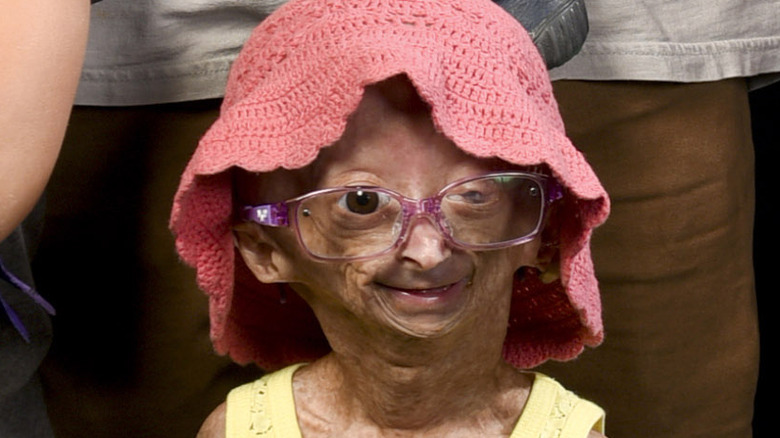YouTuber Adalia Rose's Rare Progeria Diagnosis Explained
YouTube star Adalia Rose Williams died on January 12th, according to a post shared to her social media accounts (via ET). The post read, "January 12, 2022, at 7 pm Adalia Rose Williams was set free from this world. She came into it quietly and left quietly, but her life was far from it. She touched MILLIONS of people and left the biggest imprint in everyone that knew her." The post went on to say that Williams was "no longer in pain and is now dancing away to all the music she loves. I really wish this wasn't our reality but unfortunately it is." It finished by thanking her supporters and the doctors and nurses that worked with her for years. "The family would now like to mourn this huge loss in private," the post ended.
Williams was diagnosed with Hutchinson-Gilford progeria syndrome when she was about 3 months old (via New Zealand Herald). Williams' mother said that she first noticed signs of the condition when Williams was a month old and had not grown very much. After she was diagnosed, Williams began to exhibit more symptoms. The average life expectancy of someone with Hutchinson-Gilford progeria syndrome is about 13 years old.
About Hutchinson-Gilford progeria syndrome
Also referred to as progeria, Hutchinson-Gilford progeria syndrome is a rare progressive genetic disorder (via Mayo Clinic). It causes children to age very quickly and often leads to death at around 13 years old. Symptoms usually begin in the first year of a child's life as growth significantly slows down. Motor development and intelligence remain at normal levels. The most common symptoms of this disorder include below-average height and weight, small jaw, beaked nose, disproportionately large face, and prominent eyes. Other common symptoms include hair loss, wrinkled skin, visible veins, and a high-pitched voice.
Progeria can also lead to health issues like cardiovascular disease, abnormal tooth formation, hearing loss, fragile bones, stiff joints, and insulin resistance. This condition is caused by a genetic mutation and is rarely passed down. It is usually diagnosed within the first year of a child's life. There is currently no cure, although some treatments are promising.


